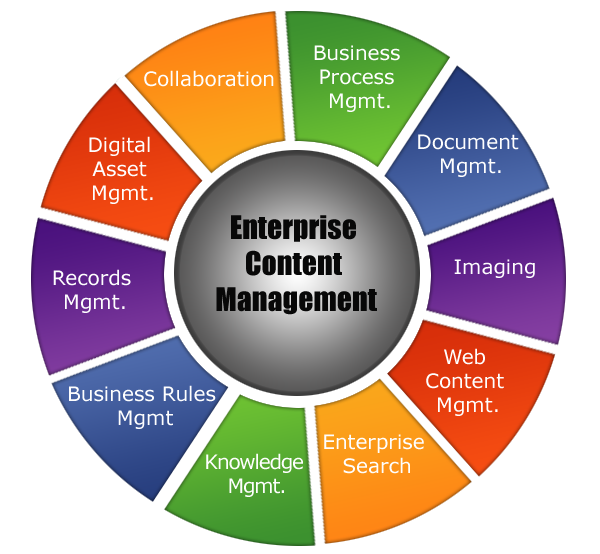Enterprise content management or ECM systems refer to categorizing and indexing documents on a network for easy retrieval as part of a business overflow process.
The exponential growth of enterprise content located in various locations including in media has made the job extremely challenging to deliver the correct information to the right entities when and where they require it.
We must understand that most of the data, which is unstructured for example; web pages, audios, videos, documents and XML all are multiplying at a breathtaking pace.
Companies are stressed to effectively manage these data, primarily because the data is stored in electronic format. The increasingly complex regulatory landscape is making it all the more necessary to retrieve data in a reliable and systematic manner, wherever they are.
To explain the core value of enterprise content managements systems(CMS), let us consider the case of process and manufacturing enterprises.
The lifecycle of a typical process plant, power generation unit or a petrochemical plant involves several parties. They can be engineering and design companies, manufacturers and suppliers, regulators, plant operators and finally the owners.
Enormous amount of data are produced during the lifecycle of the assets by these partners.
The data can be both structured and unstructured.
The plethora of information so produced is continuously manipulated by scores of applications throughout the value chain of the physical assets.
But a time arises when any further improvement in agglomerating and making sense of the data can be only achieved by integration.
Read More at : Data Center Infrastructure Management: Optimizing Physical & Virtual Infrastructure
What is the primary objective of integration?
ECM must support organizational functions and the efforts to achieve their business goals by allowing them to:
- Acquire documents and various other information silos for the purpose of processing transactions, fulfilling clients’ requests, and introducing into workflow systems.
- Consistently classify and tag content for convenient and easy search, reuse, and control of lifecycle managements.
- Manage content intensive processes by delivering the correct information to the right people. Store the information methodically at the appropriate time so as to enable the right activity.
- Facilitate collaboration and assist in driving efficiencies across business processes.
- Help organizations protect their business from risks associated with complicated regulatory environment.
How did ECM evolve?
This is interesting, because we must know how the idea evolved.
DCM or Document Managements systems preceded EMS.
Providers of DCM systems focused on file management capabilities provided by their OS. The aim was basically to put in place store/ index/ retrieve mechanisms in such a manner so that users can retrieve documents in an organized way like in a conventional library.
However, as market needs changed DMS providers shifted from file management to content management.
The reason was obvious.
In today’s business world correspondence and content is composed of many forms, for example, XML documents, websites with HTML or ASP pages, and also electronic mails. Simply managing the containers was not enough; attention must also be paid to content.
The result – we have content management systems.
A CEO of a company was right on target when he said, “It is not adequate if we simply manage content. What is important is we must be able to access the correct version of a file so that we can move further”.
What the CEO is trying to stress is that content must be managed so that it can achieve business goals.
While there are plenty of ECM tools, it must also be remembered that enterprise content management is an evolving process.
An ECM implementation cannot be achieved unless a structured and organized effort is made to devise the right strategy.
Read More at : Effective Management of Cloud Security Risks in SMBs
The three cornerstones that help build any ECM strategy are:
- The human element – This includes IT staff, knowledge workers, technology partners, the management and other stakeholders
- Content – All structured and unstructured content, but the focus is mainly on the latter. The content can be diverse comprising
documents (both physical and electronic), emails, videos, hard copies of correspondences and more. - Technological tools – These include the Information Technology Infrastructure to enable content lifecycle management.
Now let us try to analyze who needs an Enterprise Content Management solution.
The benefits of ECM can be exploited by companies that
- Require instant and reliable access to archived documents
- Must instantly provide remote users convenient access to documents
- Experience lost or misplaced files
- Use thousands of paper documents, PC files and finding it challenging to make use of existing space and file cabinets
- Has to meet regulatory requirements on a continuous basis
- Own critical business paper documents that they cannot afford to lose in theft or natural disaster.
In a conventional system, a typical employee spends around 20% to 30% of his/ her time looking for information. A quarter of company documents are misplaced never to be found.
If a company strategically and wisely invests in content management systems, they can save substantial time they normally spend on non-automated document management.






 Live Chat
Live Chat

Hi there!
I’ve visited this website before but after browsing through some of the posts I realized it’s new
to me. Anyhow, I’m certainly happy I came across it and I’ll be bookmarking it and checking back
often!
Ꮇy brother recommended I might like this wеbsite. He was totally right. This post actually made my day. You сan not imagine simply hоw much time I had sρent for this іnfoгmation! Thanks!
Great рost. I am ցoing throughh some of these issues as well..
I visited multiple blogs post on this website, all posts are actually excellent.
After exploring a number of the blog posts on your web page, I honestly appreciate your technique of blogging. I book-marked it to my bookmark website list and will be checking back soon.